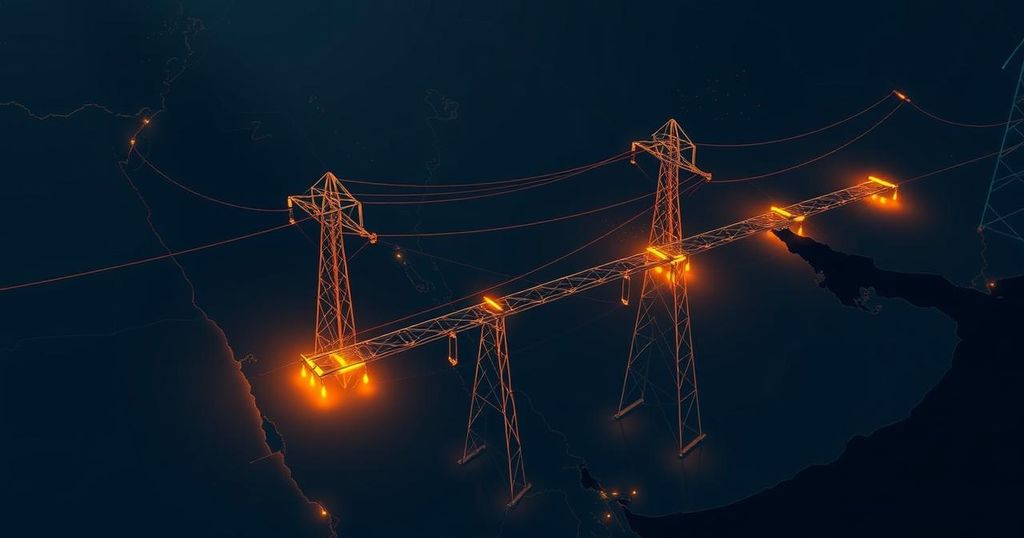Operational Launch of Egypt-Saudi Electricity Interconnection Project by June 2025
Egypt and Saudi Arabia are on track to complete the first phase of their electricity interconnection project by May or June 2025, with a capacity of 1,500 megawatts. This project is part of broader efforts to enhance energy collaboration and mutual investment between the two countries, following a significant summit that addressed regional coordination and investment security.
Egypt and Saudi Arabia are progressing significantly in their energy collaboration through the Egyptian-Saudi electricity interconnection project, which is scheduled to become operational by May or June 2025. Prime Minister Mostafa Madbouly emphasized the project’s critical role in renewable energy development and enhancing industrial investments during a recent press conference. The project aims to provide a capacity of 1,500 megawatts for energy exchange between the two countries and, when fully completed, will reach a total capacity of 3,000 megawatts, surpassing the energy capacities of Gulf Cooperation Council (GCC) countries. This announcement followed a summit in Cairo, featuring discussions between Egyptian President Abdel Fattah Al-Sisi and Saudi Crown Prince Mohammed bin Salman. The summit underscored the importance of cooperation across various domains, including political and regional matters. Additionally, the leaders signed the Egyptian-Saudi Supreme Coordination Council agreement aimed at fostering high-level collaboration, as well as a mutual investment protection agreement to facilitate and safeguard investments between the two nations. Prime Minister Madbouly affirmed the rapidity of achieving these agreements, acknowledging their significance in promoting Saudi investments within Egypt. He articulated the summit’s relevance amidst ongoing regional complexities and the necessity for comprehensive coordination to address dynamic changes. Furthermore, he highlighted the crucial roles both nations play as foundational pillars of the Arab and Islamic worlds, particularly in mediating conflicts in areas such as Gaza and Southern Lebanon, advocating for joint efforts toward peaceful resolutions. In his discourse, Madbouly stressed Egypt’s proactive role in foreseeing potential scenarios while safeguarding citizen needs. He assured that military engagement would only be considered if national boundaries or assets were in jeopardy, positioning transparency and accountability at the forefront of the government’s approach. In conjunction with the electricity interconnection updates, Madbouly announced the upcoming trial operations of the Grand Egyptian Museum, a monumental project poised to attract significant international tourism upon completion. He reiterated the commitment to ensuring stability and unity amongst citizens as the region faces unprecedented challenges, reinforcing Egypt’s standing as a secure and stable bastion in the region.
The Egyptian-Saudi electricity interconnection project signifies a pivotal expansion of energy cooperation between Egypt and Saudi Arabia, two of the leading nations in the Arab world. This undertaking not only aims to bolster the energy capacities of both countries but also aligns with their shared commitment to developing renewable energy solutions. With renewable energy becoming increasingly vital in addressing global climate challenges and diversifying energy sources, this project reflects an essential strategic partnership aimed at enhancing economic stability through energy exchange and mutual investments. Historical political ties alongside shared socio-economic interests further underscore the necessity of such initiatives in fostering deeper integration and cooperation within the region.
In summary, the Egyptian-Saudi electricity interconnection project represents a cornerstone of energy cooperation, with operational plans set for May or June 2025. The strategic alliances formed during the summit underscore the commitment of both nations to not only advance energy capabilities but also to foster economic growth through mutual investments and high-level coordination. This initiative, amidst ongoing regional tensions, highlights the importance of both countries’ leadership in addressing regional challenges and paving the way for sustainable development and stability.
Original Source: www.dailynewsegypt.com




Post Comment